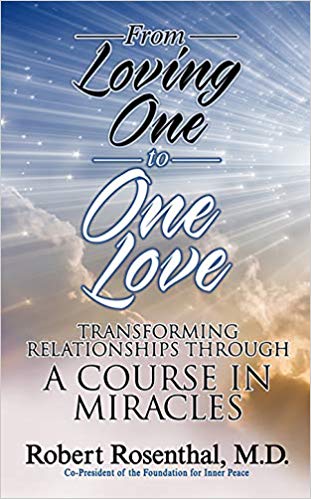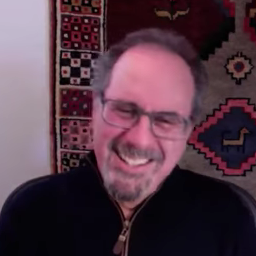“The ego sees relationships as arrangements that allow us to get things, qualities, people, events, opportunities, experiences that we don’t think we have on our own. So really relationships in the ego’s mind are about plugging holes in your self-concept. … Whereas in the Holy Spirit’s view, every relationship is an opportunity to remember the True Self which lives in both of you and remember it by recognizing it in your brother … or in your sister. … Relationships are crucibles for enlightenment.” – a quote from Dr. Bob near the beginning of the video
In this video, “Dr. Bob” a.k.a. Robert Rosenthal, M.D. – author of “From Never-Mind to Ever-Mind“ talks about his latest book which releases on February 4, 2020: “From Loving One to One Love: Transforming Relationships Through A Course In Miracles.” In this conversation with Bruce Rawles, Bob – after a quick review of a few foundational ideas from the earlier book – covers some of the highlights of this 2nd book – the next in a 5-part series. This book explores relationships, certainly one of the most important emphases in ACIM with its practical classroom of applied forgiveness.
Here are some gem quotes from the first 100 page of Bob’s new book:
“Ideally it wants to return to oneness, but it no longer remembers the way back. Furthermore, this new “I” has its own agenda. It disdains oneness, because it knows it can never achieve it. It wants something better than oneness, something more special than love, something that will justify its decision to separate. This “I,” this new self, is of course the ego.
If you really were an ego and nothing else, there would be no hope of ever returning to oneness. But that’s not the case. You can’t change the nature of what God created you to be. You can only dream that you’ve changed, and in that dream believe you’ve become something else, something you’re not and could never be. As long as you stay asleep, you will believe your dream is real. Your dream of separation makes the ego real for you.”…
“In a sense, the needs we project onto our lover in the special relationship do indeed have their origins in poor parenting. But it’s not the parenting we received as children. The real ‘poor parenting’ comes from asking the ego to parent and watch over us instead of God.”
…
“You might think of the special love relationship as a dream within a dream: a dream of special love within the greater dream of separation and lack of love, a dream of restitution for the loss of God. One dream tries to offset the other and make it tolerable or even desirable.”
…
“Whenever we feel a strong desire for anything—a person, an object, or an outcome—it should serve as a red flag that the ego has hijacked the mind into serving its agenda.”
…
“I’ve practiced giving my attractions to the Holy Spirit in this way and watched them fade in seconds. This used to trigger a strange sense of loss and disappointment, as if I had given up something of value, but now it brings relief and gratitude.”
Among the many insights shared in the video – which give a hint of even more in the book – is looking at ego’s use of shame – the ego’s maladaptive idea that we (as seemingly separate selves) are bad as a result of a companion crazy concept of ego’s insane thought system that propagandizes the unchallenged assumption that we did something bad (guilt) which of course is unconscious yet unfounded until we look at both crazy ideas (guilt and shame) with the gently vaporizing light of Holy Spirit’s gaze, releasing all from condemnation.
“To most of us, guilt and shame seem quite similar. Both make us feel bad. But guilt is about something we did, while shame is about who or what we are. Guilt arises in response to an action we took that we regret, while shame results from anything that exposes us as inferior, incompetent, damaged, or disgusting.”
…
“Now the mind, with all its dark secrets, appears to be private, hidden away inside a body. The body becomes a stand-in for the self: our avatar in the virtual-reality game of life. We believe we are the body.”
…
“Nathanson identified four fundamental maneuvers by which we try to live with shame rather than trying to heal it. He labeled them withdrawal, avoidance, attack-self and attack-other. He pictured these as occupying the four points of a compass in which withdrawal and avoidance are paired along one axis and attack-other and attack-self along the other. He called this the ‘Compass of Shame.'”
…
“You can make others special in a negative sense by highlighting their sins in order to justify your grievances, or you can make them special in a positive sense by idealizing them in order to paper over their sins. Either way you have made their ‘sins’ real to you.”
…
“If we are sinful, we will seek to cover up our shame so no one can see it and judge us for it. Like Adam and Eve, we’ll need a fig leaf to hide behind, and that fig leaf is specialness. We will also be happily distracted by the fig leaves of others and prefer to focus on them rather than the holiness that lies beneath. On the other hand, if we are sinless, the eternal Child of God, the extension of Love itself, then we needn’t do anything to prove our holiness or justify our worth in God’s eyes. Holiness is our birthright and everyone else’s too. In the light of oneness, there is no need for specialness. It does not and cannot exist.”
…
“A Course in Miracles states many times that if you want to resolve a problem, it is not enough to deal merely with its consequences. You must first identify its cause and fix the problem at that level. Otherwise you are not really addressing the problem at all, only its effects, and the problem will keep recurring in one form or another.”
Along with Tamara Morgan – daughter of Judy Whitson, the founder of the Foundation for Inner Peace (FIP) which publishes A Course In Miracles, Dr. Bob is co-president of FIP, as well as the author of From Plagues to Miracles (FPTM) – his prior book about ACIM –which explores the metaphysical metaphors and symbolism of the story of Exodus, available in both paperback and Kindle editions. The book page on his (new) Robert Rosenthal, M.D. website provides an overview of his books, novels, and screenplays. Listen to numerous interviews with Dr. Bob here as well on Charlotte Spicer’s BlogTalkRadio channel series.
This video was recorded on January 17, 2020.

